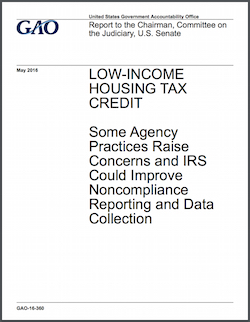
The IRS should clarify when agencies should report noncompliance with low-income housing tax credit program requirements, according to a report issued by the Government Accountability Office in May and made publicly available this month.
Also, the GAO recommended that the IRS participate in the interagency Rental Policy Working Group to assess the use of the Department of Housing and Urban Development database to strengthen IRS oversight.
The IRS agreed with the GAO that it should improve its noncompliance data, according to the GAO, but also said that it was constrained by resources. HUD reacted to the findings by supporting using its expertise and experience with administering housing programs to improve the LIHTC.
The Senate Judiciary Committee asked the GAO to review allocating agencies’ oversight of the LIHTC. The GAO found that more than half of the qualified allocation plans (developed by 58 allocating agencies) that it analyzed did not explicitly mention all selection criteria and preferences that Section 42 required by the Internal Revenue Code. HUD has raised fair housing concerns about this practice, saying that local support requirements, such as letters, could have a discriminatory influence on the location of affordable housing, according to the GAO.
In a July 2015 report, the GAO found that IRS oversight of allocating agencies was minimal and recommended joint administration with HUD to more efficiently address oversight challenges. The latest review shows that IRS oversight remains minimal, according to the GAO. Further, the IRS has not used the information that it receives from allocating agencies to identify trends in noncompliance, having recorded only about 2% of the noncompliance information it received since 2009 in its database.
“In contrast, HUD collects and analyzes housing data, and through a Rental Policy Working Group initiative, now adds LIHTC inspection results to its database,” the GAO noted. The IRS division responsible for LIHTC was unaware of this effort and is not involved with the working group. By participating in the working group, IRS could leverage HUD data to better understand the prevalence of noncompliance in LIHTC properties and determine whether to initiate audits.
In a report issued last month, the Bipartisan Policy Commission proposed a new federal program for senior supportive housing that uses “project-based” rental assistance and low-income housing tax credits to finance new construction and attract funding from healthcare programs. Since its inception three decades ago, the tax-credit program has encouraged $100 billion in private investment in affordable rental housing, the report asserted.



